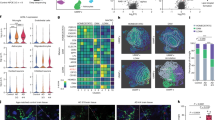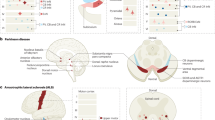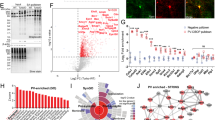Abstract
Both Alzheimer's disease and senile dementia of the Alzheimer type (AD/SDAT) are progressive dementias characterized neuropathologically by the presence in the cerebral cortex of numerous neurofibrillary tangles and neuritic plaques1. We use the abbreviation AD/SDAT to denote all such cases, irrespective of age of onset2. Studies of neurotransmitter-related parameters in autopsied brain tissues from patients with AD/SDAT have, to date, been confined to five putative transmitter systems. Acetylcholine-releasing neurones seem to be most markedly and consistently affected, as judged by the extensive reductions in choline acetyltransferase (ChAT) and acetylcholinesterase activities that have been reported3–5. Despite numerous studies, there is no consistent evidence for the involvement of neurones releasing dopamine, noradrenaline, serotonin, or γ-aminobutyric acid in AD/SDAT6, nor for loss of muscarinic cholinergic receptors7. Thus, the involvement of cholinergic neurones in AD/SDAT seems to be specific. However, the possible involvement of neurones using other chemicals as transmitters has yet to be explored. The recent recognition of the existence of so-called ‘peptidergic neurones’ in the mammalian brain (for review see ref. 8) and the availability of radioimmunoassay (RIA) techniques for studying these peptides, have led us to begin a systematic investigation of neuropeptides in autopsied brain tissue from cases of AD/SDAT, and from neurologically normal individuals. We report here results obtained with a RIA for somatostatin, showing that somatostatin-like immunoreactivity in the cerebral cortex is reduced in tissue from AD/SDAT patients.
This is a preview of subscription content, access via your institution
Access options
Subscribe to this journal
Receive 51 print issues and online access
$199.00 per year
only $3.90 per issue
Buy this article
- Purchase on Springer Link
- Instant access to full article PDF
Prices may be subject to local taxes which are calculated during checkout
Similar content being viewed by others
References
Wisniewski, H. M. & Terry, R. D. in Neurobiology of Aging (eds Terry, R. D. & Gershon, S.) 265–280 (Raven, New York, 1976).
Katzman, R. Archs Neurol., Chicago 33, 217 (1976).
Davies, P. Brain Res. 171, 319 (1979).
White, P. et al. Lancet i, 668 (1977).
Perry, E. K., Perry, R. H., Blessed, G. & Tomlinson, B. E. Lancet i, 189 (1977).
Terry, R. D. & Davies, P. A. Rev. Neurosci. 3, 77 (1980).
Davies, P. & Verth, A. H. Brain Res. 138, 385 (1977).
Hokfelt, T., Johansson, O., Ljungdahl, A., Lundberg, J. M. & Schultzberg, M. Nature 284, 515 (1980).
Arimura, A., Sato, H., Coy, D. H. & Schally, A. V. Proc. Soc. exp. Biol. Med. 148, 784 (1975).
Author information
Authors and Affiliations
Rights and permissions
About this article
Cite this article
Davies, P., Katzman, R. & Terry, R. Reduced somatostatin-like immunoreactivity in cerebral cortex from cases of Alzheimer disease and Alzheimer senile dementa. Nature 288, 279–280 (1980). https://doi.org/10.1038/288279a0
Received:
Accepted:
Issue Date:
DOI: https://doi.org/10.1038/288279a0
This article is cited by
-
Interrogation of the human cortical peptidome uncovers cell-type specific signatures of cognitive resilience against Alzheimer’s disease
Scientific Reports (2024)
-
Genetic Ablation of Dentate Hilar Somatostatin-Positive GABAergic Interneurons is Sufficient to Induce Cognitive Impairment
Molecular Neurobiology (2024)
-
Abnormal accumulation of extracellular vesicles in hippocampal dystrophic axons and regulation by the primary cilia in Alzheimer’s disease
Acta Neuropathologica Communications (2023)
-
Proteostasis failure exacerbates neuronal circuit dysfunction and sleep impairments in Alzheimer’s disease
Molecular Neurodegeneration (2023)
-
Somatostatin slows Aβ plaque deposition in aged APPNL-F/NL-F mice by blocking Aβ aggregation
Scientific Reports (2023)
Comments
By submitting a comment you agree to abide by our Terms and Community Guidelines. If you find something abusive or that does not comply with our terms or guidelines please flag it as inappropriate.



